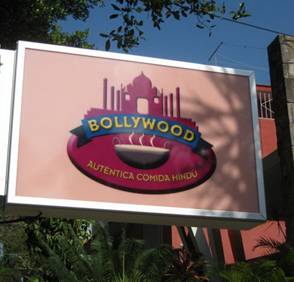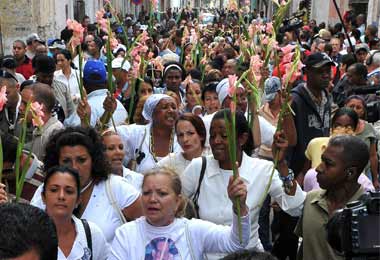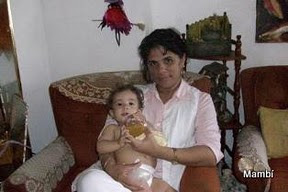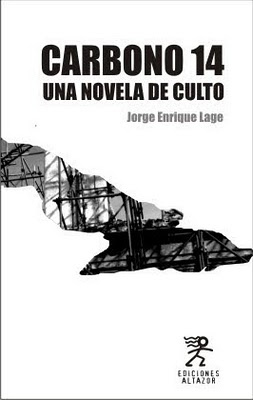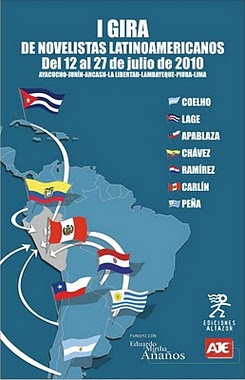 JORGE LAGEZAMA LIMA, originally uploaded by orlandoluispardolazo.
JORGE LAGEZAMA LIMA, originally uploaded by orlandoluispardolazo.
la-fortaleza-de-la-soledad.blogspot.com/2010/06/ediciones…
Months back, Willy del Pozo and Harold Alva, editor and deputy editor respectively of Altazor Editions, told me about an important project they were thinking of going forward with. Weeks passed and the objective showed signs of being coming off, and then they put it on hold to start the first tour of Latin American novelists, that will take them through different cities in the interior of the country, finishing in Lima the gray.
Authors who make up the delegation are: Ernesto Carlin (Peru), Claudia Apablaza (Chile), Miguel Antonio Chávez (Ecuador), Oliverio Coelho (Argentina), Jorge Enrique Lage (Cuba), Pedro Peña (Uruguay), Juan Ramirez Biedermann ( Paraguay).
For those who do not know, the publisher headed by Willy del Pozo led off its revival last year with nice editions that have enjoyed the sign of criticism and genuine appreciation by readers. Among them are JOURNEY THAT NEVER ENDS by Carlos Calderón Fajardo; MIGRATION by Victor Coral; as well as on the long-winded novel VALLEJO AND CELL NON PLUS ULTRA of Jorge Najar.
This first tour of Latin America represents for Altazor his definitive consecration in the panorama of publishers in Peru. All authors included in this catalog have a wide impact internationally. I know.
Last year Altazor Editions did the first tour of Peruvian writers in the north of the country. The experience was rewarding, it could not be otherwise if in the Altazor-mobile were Carlos Calderón Fajardo and Socrates Zuzunaga. Then we promise to repeat the adventure but thought to involve all the writers in our America. What started as a topic of conversation gained in seriousness and now we are pleased to announce the launch of the FIRST TOUR OF LATIN AMERICAN NOVELISTS, which opens in Ayacucho on July 12 and will close in Lima on July 26. The itinerary includes the Ayacucho, Junín, Ancash, La Libertad, Lambayeque, Piura and Lima.
This event is made possible through our strategic alliance of our publisher with the Eduardo and Mirtha Añaños Foundation. Which confirms that you can still work on projects of this nature with other private companies who have understood the importance of culture. This tour begins in the manner of a liberating expedition and coincides with the bicentenary of Latin American political independence. It will leave from Ayacucho to other cities such as Huanta, Tarma, Huancayoin our central Andes and continue north to Chiclayo and then Piura, a city where Jorge Tume, with Infolectura, has organized the First International Book Fair.
We know that this is an event whose significance is due to the quality of the invited writers, authors under 40 who present powerful works which speaks of the excellent health of Latin American literature. A contribution that without a doubt will do its part to heal the fractures of an area overwhelmed by the constant political, social and economic crises. This first tour will include the following writers: Oliverio Coelho (Argentina) with his novel BORNEO; Jorge Enrique Lage (Cuba) with CARBON 14: A NOVEL OF WORSHIP; Claudia Apablaza (Chile) with EME / A; Miguel Antonio Chávez (Ecuador) with The Heimlich maneuver; Pedro Peña (Uruguay) THE NIGHT THAT IS NOT REPEATED; Ernesto Carlin (Peru) TAKASHI: STOLEN STORIES; and Juan Ramirez Biedermann (Paraguay) THE FUND OF NOONE. They are ones responsible for this new itinerary, they are our choices, with them and for them we leave, two hundred years later, on another expedition of liberation.



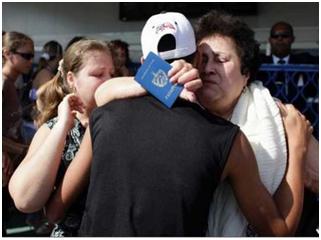 Recently the Archbishop of Havana announced the release of 52 political prisoners over the course of three to four months. A rather strange act, this being a secular state. In turn, Miguel Angel Moratinos, Spain’s Minister of Foreign Affairs, told reporters that those released will travel to his country, and once they are out of Cuba, they will require government authorization to return, while their family members may do so whenever they wish.
Recently the Archbishop of Havana announced the release of 52 political prisoners over the course of three to four months. A rather strange act, this being a secular state. In turn, Miguel Angel Moratinos, Spain’s Minister of Foreign Affairs, told reporters that those released will travel to his country, and once they are out of Cuba, they will require government authorization to return, while their family members may do so whenever they wish.
